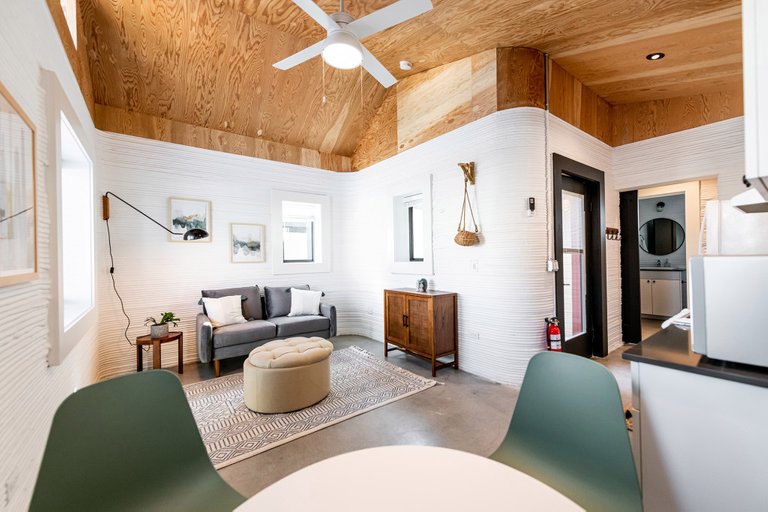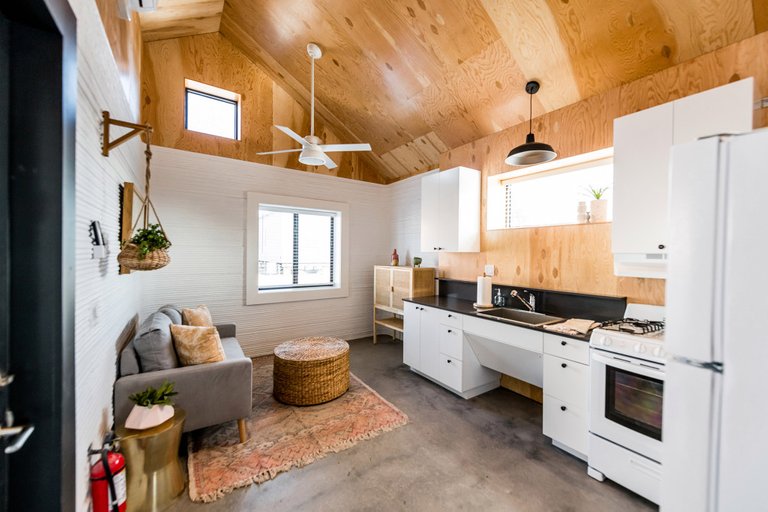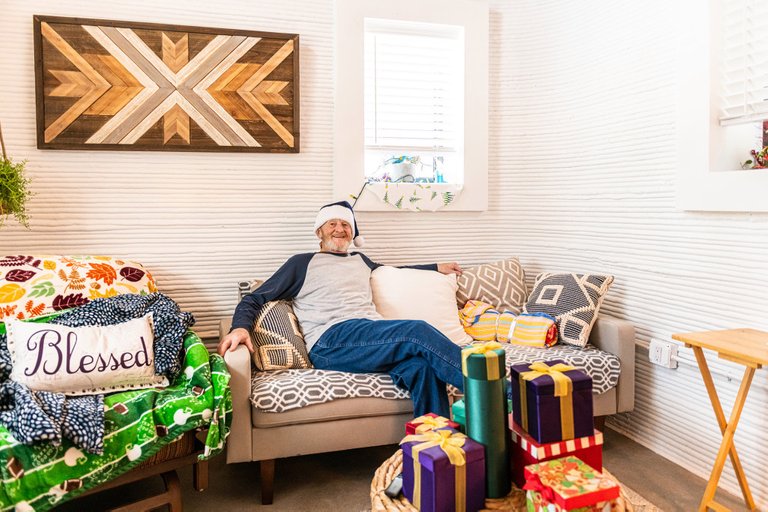Austin Man First In United States To Live In A 3D Printed House
This is story I have followed for a number of years. Well, not this individual but the technology. It is something that I believe will change the face of construction.
We are starting to see 3D printing entering many industries and none with more potential impact than with construction. Already, there is a 3D printed home for sale in Riverhead, N.Y. At the same time, we are seeing a development planned to take place in California as well as a couple units in Austin, TX.
Tim Shea, a former homeless man, moved into his present house back in September. According to the firm that built his home, he is the first person to live in one in the United States.
This is part of a project called Community First! Village. It is part of a 51 acre development which now has 500 homes on it. The project is meant to help seniors who are affected by the raising cost of living in the area.
Shea is one of the seniors in the community, and the fist to occupy one of the handful of homes that were 3D printed.
Prior to this, he was living in a RV.

With the rising cost of real estate in certain areas, projects like these are taking on new meaning.
The nonprofit Community First! put $18 million into the tiny home village in Austin to help the chronically homeless get off the streets. The village initially had space for 180 residents, who pay about $300 in rent, and have job opportunities on-site.
The community was established in 2015, and created by real estate developer Alan Graham, who had spent the past two decades volunteering on the streets of Austin through a project called Mobile Loaves & Fishes. For Community First! Village, choosing to test the new technology was a natural extension of its willingness to experiment.
Shea's home is about 400 square feet and provides a lot of the comforts of larger dwellings.

Shea uses a wheelchair so he chose the open floor plan.

As we can see, the structures are made out of concrete enabling them to stand up to the elements. At the same time, while not large, they are ideal dwellings for people who are on a fixed income. Many cannot afford such accommodations for a few hundred dollars a month, especially in an area like Austin.
ICON is the company that provided the printer to construct these homes. It did a total of 6 in this project.

As stated in the past, the advantage of 3D printing is that there is a lot less waste, can be done faster, less expensive (due to reduced labor costs) and can create unique designs. Structures no longer need to be square.
The company already did a couple dozen structures in the United States and Mexico. It has a goal to provide affordable dwellings to people everywhere in the world.
Having raised $53 million so far in VC funding, the company is not stopping there. In fact, it is looking to leave the planet all together.
In another project, the company has partnered with NASA to develop space-based construction systems to build on the moon, including homes, infrastructure and more.
Here we see a vital step forward. When we start to discuss anything in space, the investment dollars start to pile up. The intention, right now, is for space colonization and building structures on different heavenly bodies is obviously a priority.
The benefit to this is there will be breakthroughs that will be applied here on Earth.
In other words, this is not likely to be a passing fad.
ICON is not the only company that is involved in this industry. There are a few other companies that made their own 3D printers to create homes. Over the next few years, as these first ventures become successful, it is likely we will see more entering.

For someone like Tim Shea (pictured above), this is life changing. He is no longer having to live on the streets or in some rundown RV.
In addition the the humanitarian aspect, these printers are poised to completely revolutionize construction. The cost savings we are seeing typical run about 50% of similar new construction using traditional methods. That, however, is using 2020 technology.
The big question is where things will be in 2030 or 2035? If we are printing structures on other planets, there is a great chance we will be doing it here, and for much less money than is required today.
3D printers fall under information technology. This means that we are looking at a serious reduction in cost, both for the unit and to operate. As the material sciences expand, we will see less costly yet better materials used to print.
All of this leads to the idea that we could see serious cost savings within the next 5 years.
All photos and quotes from this article along with a video interviewing Shea.
If you found this article informative, please give an upvote and rehive.

gif by @doze

logo by @st8z
Posted Using LeoFinance Beta
https://twitter.com/taskmaster4450/status/1375263690426101766
Wow! This is incredible and the house is beautiful. It made me want to have one for myself, I live on rent hahaha ...
But there is no doubt that this is only the first step towards making this industry one of the main industries for people's housing in the future. Just by the costs that would cause a good economy, it would be enough for us to have a mass acceptance.
Posted Using LeoFinance Beta
Not designed for a family since it is very small but that will come.
Posted Using LeoFinance Beta
Incredible how technology is advancing and being implemented for this type of things. Undoubtedly it will be of great help to everyone that homes can be built in this way. Less costs, easy acquisition and in less time... A marvel.
By the way, now to invest in the shares of companies that are dedicated to this if we see acceptance in the market 📈💪.
Best regards!
Posted Using LeoFinance Beta
They arent publicly traded so cant do it. In fact, they are still in the phase where they are getting VC money.
Posted Using LeoFinance Beta
The house looks really nice. I really do wonder how much it will affect the costs. The only problem I see is that I think the existing system will fight the 3D printing home system from taking dominance. They earn money off the extra time and manual work in building the house. Personally, I hope that housing costs drop to 25% or even 10% of the current prices. Maybe this way, we won't have a housing crisis in California.
Posted Using LeoFinance Beta
They can try but it wont work. The start ups will start eating into their share if they do not embrace it.
We are going to see these companies license the technology out which means that builders will jump on board. If the big boys do not, others will.
Posted Using LeoFinance Beta
I think it will take time for it to happen. You can probably expect the 3D companies to spend millions of dollars to get their case read in court. I personally think the unions and environmental people will do that for the construction industry interests.
Posted Using LeoFinance Beta
Awesome stuff !!!
Innovation at its best ..
Posted using Dapplr
It's great to see this finally happening! To be perfectly honest, I hope it sets off a major "correction" in the greater housing market which is so grossly overpriced it's not even funny... the gap between the actual cost of materials and labor to build a house and the final sales price has inflated to the point of absurdity.
I expect the conventional construction industry will fight it tooth and nail, a bit like banks and crypto. But hey, game changers eventually take hold... if they didn't, we'd still be pulled around by horses while writing each other letters with pen and ink...
=^..^=
Posted Using LeoFinance Beta
I would not be surprised to some of the national home builders buying a few 3-D printers down the road.
It only makes sense for them to jump on this if it will help them with their margins.
Posted Using LeoFinance Beta
This is key to me . . . the better materials bit.
I've been reading your articles with interest but at the back of my mind is always the nagging commentary "I thought we were trying to get away from using concrete because of it's environmental impact".
Posted Using LeoFinance Beta
The house looks nice. I did notice that the wiring is on the surface of the wall. I guess there will be more advanced options available later where the finishing will be better. This technology is only getting started.
Posted Using LeoFinance Beta
Yep. Still a lot of things to be worked out but the technology is starting to make some headway.
How long until it is the norm? We will see. I would say this will be fairly common in a couple of years even if it is still far from the dominate way to build homes.
Posted Using LeoFinance Beta
I see why you're excited about this but that roof doesn't look 3D printed and I'm sure the electric, pluming a ton of other stuff has to be done by humans, also any new technology is more expensive in the beginning so I'm waiting for more time to pass until I'm convinced they can roll out houses that are much cheaper than what we have now
Posted Using LeoFinance Beta
JUst the main walls are 3D printed. The roof and fittings and everything else are a traditional build.
Posted Using LeoFinance Beta
Now, this is right up my street! I love this as a means of getting people into affordable housing. Never heard of this company before but no doubt the rest of the day will be spent checking out their environmental credentials and the sustainability and longevity of the materials they're using.
Good share. Thank you and have a great weekend Tasky :-)
If sustainable housing for the homelesss is of any interest, check out a guy called Paul Elkins on Youtube. He builds tiny homes and shelters using coroplast that he gets from the posters after elections!
Posted Using LeoFinance Beta
I'm not against it at all. It solves a huge problem and in time, when costs can be even more reduced, it's going to make a difference.
Even though it's tiny, it's enough for one person or two, if needed. How many are living in this size apartments across the world. Better than nothing.
My only concern is how resistant is to low temperatures and how can preserve the heat.
Posted Using LeoFinance Beta
I havent read about that.
They did print a house in New York that will have to weather the cold so it much be able to do it.
Posted Using LeoFinance Beta
One of the benefits of building a house with 3D printing technique is that it provides more flexibility and convenience. Experimenting with various shapes and curves in home construction is normally difficult with traditional construction methods, but can be done quite easily with 3D printing.
Posted Using LeoFinance Beta
The innovation is just getting started. We havent seen it really be experimented with yet.
The next few years will see a lot of advancement.
Posted Using LeoFinance Beta
Very nice, now only if they could print money...O wait they already do!
Posted Using LeoFinance Beta

To understand how developments in 3D printing will affect constructions it's easier to look back 15-20 years and see how internet and ecommerce disrupted some business models which didn't keep up.
Posted Using LeoFinance Beta
That house looks really nice. I wonder what the construction cost comparison to traditional houses look like. However, we all know that the cost of land far outstrips the cost of the house itself in most cases so I guess that's a moot point.
Posted Using LeoFinance Beta
On this one I dont know but other reports I read it is coming in about half. They can put up the shell a lot quicker and use a lot less materials.
However, the bigger the house and more finishing, it might alter that ratio.
Posted Using LeoFinance Beta
Wow. Another great use for this technology. My only worry is the longevity of the material but with a sturdy roof on top there is no reason it shouldn't last years. A great solution to getting into the property market or solving homelessness.
Posted Using LeoFinance Beta
That’s really great work.
If it reduces the waste it’s plus too as we are polluting the environment with this waste all the time.
But this company surely want to go to moon, that’s going to be a big leap in this industry.
Good to see so much progress and plans.
Thanks for sharing
This is an amazing technology. In the end, we are inches away from affordable housing because labour cost might be significantly reduced.
Posted Using LeoFinance Beta